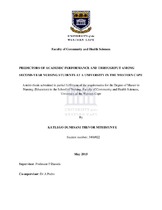| dc.contributor.advisor | Daniels, Felicity | |
| dc.contributor.author | Mthimunye, Katlego Dumisani Trevor | |
| dc.date.accessioned | 2016-01-05T09:28:10Z | |
| dc.date.available | 2016-01-05T09:28:10Z | |
| dc.date.issued | 2015 | |
| dc.identifier.uri | http://hdl.handle.net/11394/4695 | |
| dc.description | Magister Curationis - MCur | en_US |
| dc.description.abstract | Background: Institutions offering Bachelor of Nursing programmes worldwide are under increasing pressure to graduate larger numbers of students to meet the demands of the desired nurse workforce. High academic performance, which is measured by continuous assessment and examination results, is one of the major goals of higher education. However many students experience difficulty during their second year of study at the university used in this study. Aim: The overall aim of the study is to assess whether the identified predictor variables (cognitive, non-cognitive and demographic) influence academic performance of second-year nursing students at the University of the Western Cape. Methodology: A non-experimental quantitative research approach with a cross-sectional predictive design was applied. The selected sample (n=226) included all first-time enrolled Bachelor of Nursing students for the years 2012 – 2013 at the University of the Western Cape. An all-inclusive sampling method was applied. Data were obtained from the Student Administrative System Integrated and recorded in the data collection check list. Statistical Package for Social Sciences software version 23.0 was used sort and analyse the data. Simple and multiple linear regression were done. Ethics: Permission to conduct the present research study at the University of the Western Cape was obtained from the Registrar and the Director of The School of Nursing. The Research Ethics Committee of the University of the Western Cape granted ethics approval related to the research. The researcher maintained the principles of anonymity and confidentiality throughout the study. Results: The study found that the cognitive predictor variables had the strongest predictive power in association with student performance in comparison to the non-cognitive predictors and demographic variable, besides race which rejected the null hypothesis.
Conclusion: The findings provided evidence to the School of Nursing to assist them in identifying students who may be at risk of unsatisfactory academic performance and who ultimately fail to proceed to the next level of study. | en_US |
| dc.language.iso | en | en_US |
| dc.publisher | University of the Western Cape | en_US |
| dc.subject | Academic performance | en_US |
| dc.subject | Nursing students | en_US |
| dc.subject | Student Administration System Integrated (SASI) | en_US |
| dc.title | Predictors of academic performance and throughput among second-year nursing students at a university in the Western Cape | en_US |
| dc.rights.holder | University of the Western Cape | en_US |

